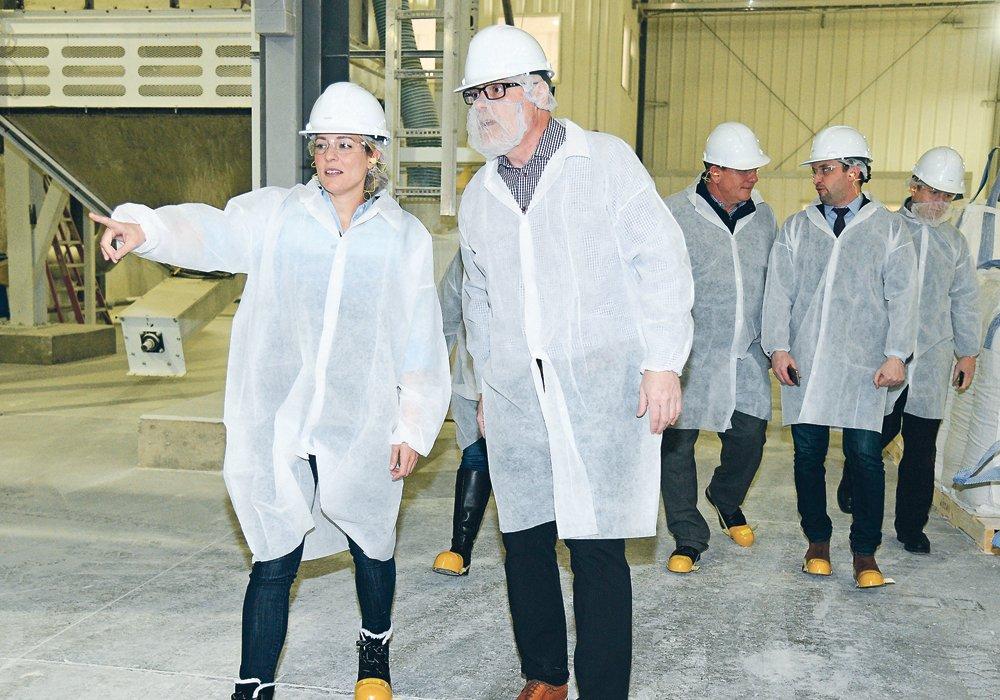Plant protein expansion about jobs: minister
- Posted:
- Category:
- PIC in the News

Protein Industries Canada is called the federal government’s first step in expanding the industry in Western Canada
VANSCOY, Sask. — One of the main goals for growing the value-added industry for plant-based proteins in Saskatchewan is to create sustainable jobs for residents, the federal minister for Western Economic Diversification said in a recent trip to Saskatchewan.
“What’s going on in the protein sector is definitely a solution to make sure that people living in Saskatchewan know that they can have access to a good paycheck while working at home and raising their children. That’s the goal,” said Melanie Joly during a tour of the Verdient Foods facility in Vanscoy, Sask., Jan. 17.
“There is anxiety here (in Saskatchewan). People are preoccupied. They’re expressing it. We need to take stock of it and we need to act, we need to find solutions.
“I just want to make sure that at the end of the day it works and it makes sense. And why did we create super clusters? We created it for people to have good jobs and notwithstanding the types of skills they have.”
Through Protein Industries Canada, she said the federal government is taking the first steps to grow the industry in Western Canada.
“That’s exactly why we created a protein super cluster. Now we need to make sure that we implement things in the right way. That way we’re building the right foundations. Things are not always perfect, but our job and my job is to make sure that we adapt them to make them work,” she said.
A former minister of Canadian Heritage, Joly was appointed minister of economic development and official languages after last November’s federal election, which resulted in a minority Liberal government.
There are six regional development agencies across the country, but she said Western Economic Diversification Canada has not had as high a presence compared to other regional development agencies farther east.
“I think the success of a good economy is when everybody feels its benefits and we know there’s been growth across the country, but at the same time it’s unevenly distributed,” she said.
“So what can we do to increase our footprint to make sure that people know that we’ve got their back and that we’re with them to create opportunities?” she said.
“This was the first time we’re bringing up a new industrial policy for the country in 30 years and we decided to do it based on the realities of different regions rather than having a completely centralized approach developed in Ottawa.”
She said companies like Verdient Foods are considered a suitable match for government support.
“What’s a good example is actually they (Verdient) have good private investors. And so the fact that they have a really good strong partnership with a world leading food company (Ingredion) helps while having strong contributions from the Camerons.”
Hollywood director James Cameron and his wife, Suzy Amis Cameron, formed and launched Verdient Foods in 2017 to develop value-added organic food products.
The organic pea protein fractionation plant has the capacity of 160,000 tonnes and may be one of the largest facilities of its kind in North America.
In December 2018, Ingredion entered into a joint venture with Verdient Foods to broaden its protein portfolio with specialty pulse-based concentrates and flours from peas, lentils and fababeans.
With annual net sales of nearly $6 billion, the Chicago-based company is a global provider of value-added ingredients in the food industry.
The company has invested a significant amount of capital into Verdient in an effort to create the most functional proteins to integrate in the new market trends of food.
Joly said having several partners is one of the drawing points for the government’s investment with Verdient and prefers to take a supportive role rather than a leading one.
“That’s even easier for us because then you have smart entrepreneurs that are really in the midst of implementing their plan. And that’s where we come in. We can help through capital, we can do zero interest loans. We can also provide expertise and help them navigate the regulatory systems that can be complicated,” she said.
It was announced in August that 22 Saskatchewan businesses and organizations are receiving $28,637,138 in federal funding through multiple programs to foster regional economic growth.
Verdient is receiving $2,145,000 through the Business Scale-Up and Productivity (BPS) stream of WED’s Regional Economic Growth through Innovation program to scale-up capacity and product offerings for plant-based ingredient markets.
This BSP stream provides repayable loans to support Canadian companies as they accelerate growth, scale up, and become more productive and competitive.
As chief financial officer for Verdient Foods, Blair Knippel said one challenge is how to turn research and development dollars into something beyond an idea and commercialize it.
“If we can turn Saskatchewan yellow peas into the OMD (One Meal a Day For the Planet) burger, we have done something that will actually allow us to pay more for Saskatchewan farmers to have, and it creates that stickiness (for their operations),” said Knippel.
“If we can pay more for protein, they’ll grow it. An extra 25 cents a bushel goes a long way. We can create that value and that’s really what this is about — creating more money for the farmers. It has more jobs for our kids. It has more jobs for our researchers.”
However, he said successes can be years in the making.
He said government assistance helps with the process of scaling up production and can help attract additional funds from private investors.
“This takes years to put together and those capital investments, those decisions are being made today. If the government assists, you will get more capital, and you will grow more jobs, you will have better education, better health care, you’ll have better opportunities for local people.”
Published by The Western Producer
Written by William DeKay
